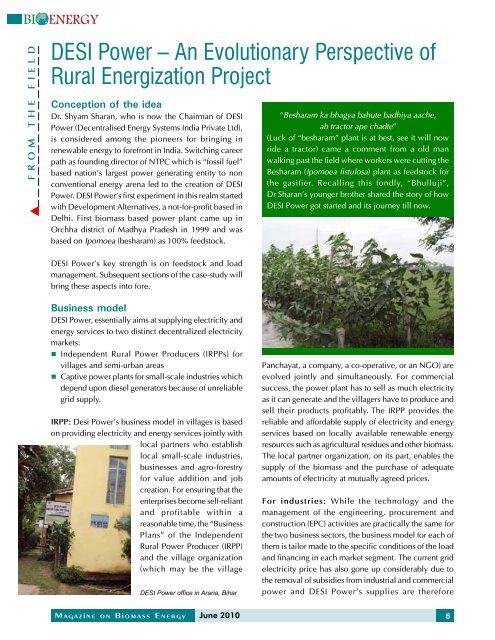issue 4 - United Nations Development Programme
issue 4 - United Nations Development Programme
issue 4 - United Nations Development Programme
Create successful ePaper yourself
Turn your PDF publications into a flip-book with our unique Google optimized e-Paper software.
FROM THE FIELD<br />
DESI Power – An Evolutionary Perspective of<br />
Rural Energization Project<br />
Conception of the idea<br />
Dr. Shyam Sharan, who is now the Chairman of DESI<br />
Power (Decentralised Energy Systems India Private Ltd),<br />
is considered among the pioneers for bringing in<br />
renewable energy to forefront in India. Switching career<br />
path as founding director of NTPC which is “fossil fuel”<br />
based nation’s largest power generating entity to non<br />
conventional energy arena led to the creation of DESI<br />
Power. DESI Power’s first experiment in this realm started<br />
with <strong>Development</strong> Alternatives, a not-for-profit based in<br />
Delhi. First biomass based power plant came up in<br />
Orchha district of Madhya Pradesh in 1999 and was<br />
based on Ipomoea (besharam) as 100% feedstock.<br />
“Besharam ka bhagya bahute badhiya aache,<br />
ab tractor ape chadte”<br />
(Luck of “besharam” plant is at best, see it will now<br />
ride a tractor) came a comment from a old man<br />
walking past the field where workers were cutting the<br />
Besharam (Ipomoea fistulosa) plant as feedstock for<br />
the gasifier. Recalling this fondly, “Bhulluji”,<br />
Dr Sharan’s younger brother shared the story of how<br />
DESI Power got started and its journey till now.<br />
DESI Power’s key strength is on feedstock and load<br />
management. Subsequent sections of the case-study will<br />
bring these aspects into fore.<br />
Business model<br />
DESI Power, essentially aims at supplying electricity and<br />
energy services to two distinct decentralized electricity<br />
markets:<br />
Independent Rural Power Producers (IRPPs) for<br />
villages and semi-urban areas<br />
Captive power plants for small-scale industries which<br />
depend upon diesel generators because of unreliable<br />
grid supply.<br />
IRPP: Desi Power’s business model in villages is based<br />
on providing electricity and energy services jointly with<br />
local partners who establish<br />
local small-scale industries,<br />
businesses and agro-forestry<br />
for value addition and job<br />
creation. For ensuring that the<br />
enterprises become self-reliant<br />
and profitable within a<br />
reasonable time, the “Business<br />
Plans” of the Independent<br />
Rural Power Producer (IRPP)<br />
and the village organization<br />
(which may be the village<br />
DESI Power office in Araria, Bihar<br />
Panchayat, a company, a co-operative, or an NGO) are<br />
evolved jointly and simultaneously. For commercial<br />
success, the power plant has to sell as much electricity<br />
as it can generate and the villagers have to produce and<br />
sell their products profitably. The IRPP provides the<br />
reliable and affordable supply of electricity and energy<br />
services based on locally available renewable energy<br />
resources such as agricultural residues and other biomass.<br />
The local partner organization, on its part, enables the<br />
supply of the biomass and the purchase of adequate<br />
amounts of electricity at mutually agreed prices.<br />
For industries: While the technology and the<br />
management of the engineering, procurement and<br />
construction (EPC) activities are practically the same for<br />
the two business sectors, the business model for each of<br />
them is tailor made to the specific conditions of the load<br />
and financing in each market segment. The current grid<br />
electricity price has also gone up considerably due to<br />
the removal of subsidies from industrial and commercial<br />
power and DESI Power’s supplies are therefore<br />
Magazine on Biomass Energy June 2010 6
















